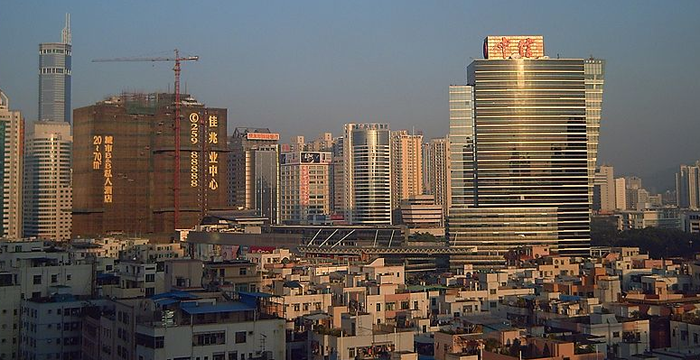China's urban migration has influenced social identity for millions, study finds

Despite China's relaxing of the official urban-rural divide in recent decades, the massive change still affects social identity for residents, especially those who moved from the countryside near cities, a University of Kansas Chinese social policy researcher has found.
"Many people said yes their quality of life has improved but they lost their social insurance through the land because the land was always a kind of last-ditch social insurance," said John Kennedy, associate professor of political science.
Kennedy and co-author Dan Chen published their findings in the essay "Urbanization and Urban Villagers: Institutional Factors and Social Identity in Urban China," which appears in the book "Area Studies in the Global Age: Community, Place, Identity" from Northern Illinois University Press.
The researchers from 2009 to 2012 observed and interviewed villagers involved in the transition of two urban villages outside Xi'an, China. China's population has transitioned from just 20 percent urban in 1982 to 51 percent in 2012, marking the most rapid urban transformation in modern history, Kennedy said.
This has created massive changes in lifestyle for millions of villagers, who didn't own farmland they used to produce crops, but they were compensated by the government to move from the land and for the cost of their homes on the property.
They moved into consolidated villages outside of cities where they lived most likely in large apartment complexes on the outskirts of town, Kennedy said. Until recent reforms China segregated its population by urban and rural identification cards to keep many people from remaining in the country and farming.
However, as those reforms now allow people to move more frequently, China has seen close to 300 million rural migrants move closer to urban areas.
Kennedy said the social attitudes of migrants seem to be split among generation lines. Many of the older migrants who are over the age of 40 show a sense of nostalgia for living in rural settings and believe the family has lots its social insurance.
"They still remember their parents or grandparents talk about how without the land they lived on, they wouldn't have survived," Kennedy said. "They had lean times and good times but at least they had enough to eat and that they could feed themselves. They said they lost that and that they lost a sense of the community."
Some attempted pockets of older-style community develops in these apartment complexes as residents set up green spaces or common areas, he said.
The younger migrants tend to appreciate more modern amenities that come with living in urban areas, though.
"They find it's much better because some of the villages had no showers and flush toilets ," Kennedy said. "This changed their quality of life for the better."
The job situation is typically still the same for most migrants, however, as they lack the education and skills to get some of the higher-paying jobs available.
"They very much still work in manual labor and basic service jobs," Kennedy said.
Studying the effects of the massive urbanization in China does illustrate how the Chinese government focused more on economic than political reform post-Cold War, which was the opposite track the Soviet Union took and likely led to its dissolution, Kennedy said.
The big question in China will be if the government can continue to manage reforms economically and more slowly politically to keep at bay dissidents who would like to see faster and more democratic reforms, he said, especially in developing reliable civic institutions like an independent court system that can handle disputes or other basic services.
"If they don't do continuous slow reform, Chinese leaders are going to have to do things faster than they think or believe necessary," Kennedy said. "But the whole point of political reform is that the urbanization was creating a new set of social demands on issues like sanitation, education, security, safety, regulation of businesses, all of which need to be addressed. If they do not adequately address these demands, then people are going to feel to get their needs met or addressed, they will need to take to the streets."
Provided by University of Kansas

















